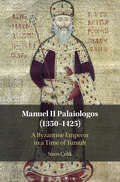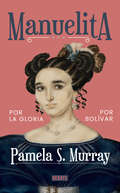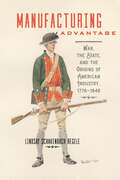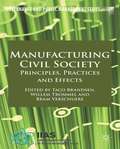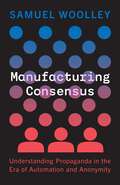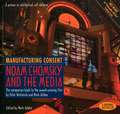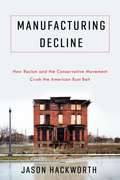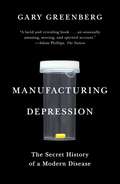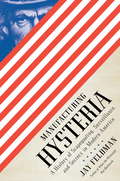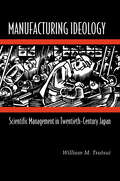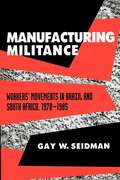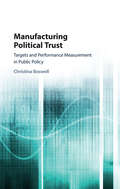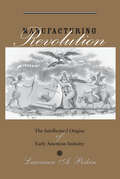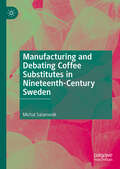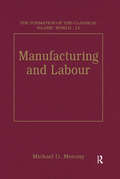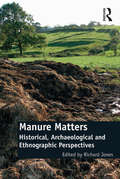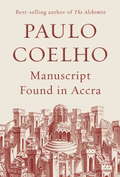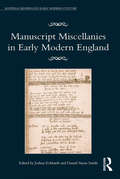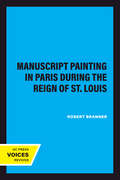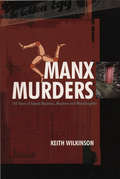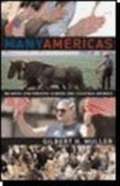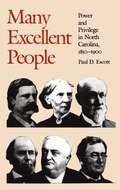- Table View
- List View
Manuel II Palaiologos (1350–1425): A Byzantine Emperor in a Time of Tumult
by Siren ÇelikFew Byzantine emperors had a life as rich and as turbulent as Manuel II Palaiologos. A fascinating figure at the crossroads of Byzantine, Western European and Ottoman history, he endured political turmoil, witnessed no less than three sieges by the Ottomans and travelled as far as France and England. He was a prolific writer, producing a vast corpus of literary, theological and philosophical works. Yet, despite his talent, Manuel has largely been ignored as an author. This biography constructs an in-depth picture of him of as a ruler, author and personality, as well as providing insight into his world and times. It offers the first analysis of the emperor's complete oeuvre, focusing on his literary style, self-representation philosophical/theological thought. By focusing not only on political events, but also on the personality, personal life and literary output of Manuel, this biography paints a new portrait of a multifaceted emperor.
Manuela Belgrano
by José Isaías García EncisoLa noche del 10 julio de 1816, en un baile memorable que tuvo lugar en la Casa de la Independencia, Belgrano queda prendado de la joven Dolores Helguero, perteneciente a una prestigiosa familia tucumana. De su relación con ella nacería Manuela Mónica. Manuela Belgrano, la hija del General es el libro que estábamos esperando para esclarecer y completar los aspectos menos conocidos de la vida afectiva de Belgrano y descubrir quién era su única hija mujer. También se revela aquí el destino de sus descendientes y la preocupación de su familia por dar a éstos el entorno social y la jerarquía que merecían. Es una importante contribución que da respuesta a la pregunta por este ocultamiento en un documento testamentario.
Manuelita
by Pamela MurrayUna biografía sobre esta gran mujer. Manuelita Sáenz (1797-1856) fue ignorada por la mayoría de los historiadores profesionales, cuyos sesgos de género la relegaron a un papel menor. Chica mala, loca, indecente y hasta ninfómana son algunos de los calificativos que ha usado la historia oficial para definirla. Pero su vida fue la de una mujer decidida, que intervino el mundo militar y de la política, entonces reservado a los hombres. Incómoda para muchos, Manuelita regresa en este dedicado trabajo de investigación que sigue sus pasos en Perú, Ecuador y Colombia. En su brillante biografía, Murray presenta a Manuelita como una de las más grandes figuras femeninas del hemisferio, precursora de una nueva revolución en América Latina: la emancipación e igualdad de las mujeres.
Manufacturing Advantage: War, the State, and the Origins of American Industry, 1776–1848 (Studies in Early American Economy and Society from the Library Company of Philadelphia)
by Lindsay Schakenbach RegeleHow manufacturing textiles and guns transformed the United States from colonial dependent to military power.In 1783, the Revolutionary War drew to a close, but America was still threatened by enemies at home and abroad. The emerging nation faced tax rebellions, Indian warfare, and hostilities with France and England. Its arsenal—a collection of hand-me-down and beat-up firearms—was woefully inadequate, and its manufacturing sector was weak. In an era when armies literally froze in the field, military preparedness depended on blankets and jackets, the importation of which the British Empire had coordinated for over 200 years. Without a ready supply of guns, the new nation could not defend itself; without its own textiles, it was at the economic mercy of the British. Domestic industry offered the best solution for true economic and military independence. In Manufacturing Advantage, Lindsay Schakenbach Regele shows how the US government promoted the industrial development of textiles and weapons to defend the country from hostile armies—and hostile imports. Moving from the late 1700s through the Mexican-American War, Schakenbach Regele argues that both industries developed as a result of what she calls "national security capitalism": a mixed enterprise system in which government agents and private producers brokered solutions to the problems of war and international economic disparities. War and State Department officials played particularly key roles in the emergence of American industry, facilitating arms makers and power loom weavers in the quest to develop industrial resources. And this defensive strategy, Schakenbach Regele reveals, eventually evolved to promote westward expansion, as well as America’s growing commercial and territorial empire. Examining these issues through the lens of geopolitics, Manufacturing Advantage places the rise of industry in the United States in the context of territorial expansion, diplomacy, and warfare. Ultimately, the book reveals the complex link between government intervention and private initiative in a country struggling to create a political economy that balanced military competence with commercial needs.
Manufacturing Civil Society
by Taco Brandsen Willem Trommel Bram VerschuereFaced with falling social cohesion governments have sought to revitalise society by trying to reconstruct local communities, civil society and citizenship. As a result, civil society is increasingly brought within the realm of public management, subject to accountability and embedded in hierarchies the impact and origins of which this book explores
Manufacturing Consensus: Understanding Propaganda in the Era of Automation and Anonymity
by Samuel WoolleyAn in-depth exploration of social media and emergent technology that details the inner workings of modern propaganda Until recently, propaganda was a top-down, elite-only system of communication control used largely by state actors. Samuel Woolley argues that social media has democratized today’s propaganda, allowing nearly anyone to launch a fairly sophisticated, computationally enhanced influence campaign. Woolley shows how social media, with its anonymity and capacity for automation, allows a wide variety of groups to build the illusion of popularity through computational tools (such as bots) and human-driven efforts (such as sockpuppets—real people assuming false identities online—and partisan influencers). They use these technologies and strategies to create a bandwagon effect by bringing the content into parallel discussions with other legitimate users, or to mold discontent for political purposes. Drawing on eight years of original international ethnographic research among the people who build, combat, and experience these propaganda campaigns, Woolley presents an extensive view of the evolution of computational propaganda, offers a glimpse into the future, and suggests pragmatic responses for policy makers, academics, technologists, and others.
Manufacturing Consent
by Mark AchbarManufacturing Consent Noam Chomsky and the Media, the companion book to the award-winning film, charts the life of America's most famous dissident, from his boyhood days running his uncle's newsstand in Manhattan to his current role as outspoken social critic.A complete transcript of the film is complemented by key excerpts from the writings, interviews and correspondence. Also included are exchanges between Chomsky and his critics, historical and biographical material, filmmakers' notes, a resource guide, more than 270 stills from the film and 18 "Philosopher All-Stars" Trading Cards!Mark Achbar has applied a wide range of creative abilities and technical skills to over 50 films, videos, and books. He has worked as editor, researcher and production coordinator."A juicily subversive biographical/philosophical documentary bristling and buzzing with ideas."--Washington Post"You will see the whole sweep of the most challenging critic in modern political thought."--Boston Globe"One of our real geniuses, an excellent introduction."--Village Voice"An intellectually challenging crash course in the man's cooly contentious analysis, laying out his thoughts in a package that is clever and accessible."--Los Angeles TimesContents:The Man. Early Influences. Vietnam A Turning Point. On His Role. The Media. Thought Control in Democratic Societies. A Propaganda Model. The Gulf "War". A Case Study Cambodia & East Timor. Concision A Structural Constraint. "Sports Rap with Noam Chomsky." A Cabal of Anti-Conspiricists. Media in Media, Pennsylvania. Alternative Media. The Linguist. Basic Premises. Nim Chimsky: Chimpanzee. And the Elusive Connection to his Politics. The Social Order. On Education. Anarchism/Libertarian Socialism. Resistance & Critical Analysis. The Critics (Media-Based). William F. Buckley, Jr. "Firing Line". David Frum Journalist, Washington Post. Jeff Greenfield Producer, "Nightline". Karl E. Meyer Editorial Writer, The New York Times. Peter Worthington Editor, The Ottawa Sun. The Critics (Other Elites). Fritz Bolkestein Former Dutch Minister of Defense. Michel Foucault Philosopher. Yossi Olmert Tel Aviv University. John Silber
Manufacturing Decline: How Racism and the Conservative Movement Crush the American Rust Belt
by Jason HackworthFor decades, the distressed cities of the Rust Belt have been symbols of deindustrialization and postindustrial decay, their troubles cast as the inevitable outcome of economic change. The debate about why the fortunes of cities such as Detroit have fallen looms large over questions of social policy. In Manufacturing Decline, Jason Hackworth offers a powerful critique of the role of Rust Belt cities in American political discourse, arguing that antigovernment conservatives capitalized on—and perpetuated—these cities’ misfortunes by stoking racial resentment.Hackworth traces how the conservative movement has used the imagery and ideas of urban decline since the 1970s to advance their cause. Through a comparative study of shrinking Rust Belt cities, he argues that the rhetoric of the troubled “inner city” has served as a proxy for other social conflicts around race and class. In particular, conservatives have used images of urban decay to craft “dog-whistle” messages to racially resentful whites, garnering votes for the Republican Party and helping justify limits on local autonomy in distressed cities. The othering of predominantly black industrial cities has served as the basis for disinvestment and deprivation that exacerbated the flight of people and capital. Decline, Hackworth contends, was manufactured both literally and rhetorically in an effort to advance austerity and punitive policies. Weaving together analyses of urban policy, movement conservatism, and market fundamentalism, Manufacturing Decline highlights the central role of racial reaction in creating the problems American cities still face.
Manufacturing Depression: The Secret History of a Modern Disease
by Gary GreenbergGary Greenberg's fascinating argument about the uniquely American pursuit of anti-depression rather than happiness.
Manufacturing Hysteria: A History of Scapegoating, Surveillance, and Secrecy in Modern America
by Jay FeldmanA vital, engaging, and sometimes troubling story of modern America's struggle to live up to its ideals. In this ambitious and wide-ranging history, Jay Feldman takes us from the run-up to World War I and its anti-German hysteria through the September 11 attacks and Arizona's current anti-immigration movement. What we see is a striking pattern of elected officials and private citizens alike using the American people's fears and prejudices to isolate minorities (ethnic, racial, political, religious, or sexual), silence dissent, and stem the growth of civil rights and liberties. Whether it's the post-World War I persecution of radicals; the Depression-era deportations of Mexican immigrants and Mexican-Americans; the World War II internment of 112,000 ethnic Japanese along with thousands of German and Italian aliens; the Cold War campaigns against Communists, gays, and civil-rights activists; or the Vietnam-era COINTELPRO operations, we see how economic, military, and political crises have been used to curtail the rights of supposedly subversive minorities. Much of the story can be laid at the feet of J. Edgar Hoover, but Feldman goes deeper to show how these tendencies have been part of a continuous vein that runs through American life. Rather than treating this history as a series of discrete moments, Feldman considers the entire programmatic sweep on a scale no one has yet approached. In doing so, he gives us a potent reminder of how, even in America, democracy and civil liberties are never guaranteed.From the Hardcover edition.
Manufacturing Ideology: Scientific Management in Twentieth-Century Japan
by William M. TsutsuiJapanese industry is the envy of the world for its efficient and humane management practices. Yet, as William Tsutsui argues, the origins and implications of "Japanese-style management" are poorly understood. Contrary to widespread belief, Japan's acclaimed strategies are not particularly novel or even especially Japanese. Tsutsui traces the roots of these practices to Scientific Management, or Taylorism, an American concept that arrived in Japan at the turn of the century. During subsequent decades, this imported model was embraced--and ultimately transformed--in Japan's industrial workshops. Imitation gave rise to innovation as Japanese managers sought a "revised" Taylorism that combined mechanistic efficiency with respect for the humanity of labor. Tsutsui's groundbreaking study charts Taylorism's Japanese incarnation, from the "efficiency movement" of the 1920s, through Depression-era "rationalization" and wartime mobilization, up to postwar "productivity" drives and quality-control campaigns. Taylorism became more than a management tool; its spread beyond the factory was a potent intellectual template in debates over economic growth, social policy, and political authority in modern Japan. Tsutsui's historical and comparative perspectives reveal the centrality of Japanese Taylorism to ongoing discussions of Japan's government-industry relations and the evolution of Fordist mass production. He compels us to rethink what implications Japanese-style management has for Western industries, as well as the future of Japan itself.
Manufacturing Mennonites
by Janis Lee ThiessenManufacturing Mennonites examines the efforts of Mennonite intellectuals and business leaders to redefine the group's ethno-religious identity in response to changing economic and social conditions after 1945. As the industrial workplace was one of the most significant venues in which competing identity claims were contested during this period, Janis Thiessen explores how Mennonite workers responded to such redefinitions and how they affected class relations.Through unprecedented access to extensive private company records, Thiessen provides an innovative comparison of three businesses founded, owned, and originally staffed by Mennonites: the printing firm Friesens Corporation, the window manufacturer Loewen, and the furniture manufacturer Palliser. Complemented with interviews with workers, managers, and business owners, Manufacturing Mennonites pioneers two important new trajectories for scholarship - how religion can affect business history, and how class relations have influenced religious history.
Manufacturing Militance: Workers' Movements in Brazil and South Africa, 1970-1985
by Gay W. SeidmanChallenging prevailing theories of development and labor, Gay Seidman's controversial study explores how highly politicized labor movements could arise simultaneously in Brazil and South Africa, two starkly different societies. Beginning with the 1960s, Seidman shows how both authoritarian states promoted specific rapid-industrialization strategies, in the process reshaping the working class and altering relationships between business and the state. When economic growth slowed in the 1970s, workers in these countries challenged social and political repression; by the mid-1980s, they had become major voices in the transition from authoritarian rule.Based in factories and working-class communities, these movements enjoyed broad support as they fought for improved social services, land reform, expanding electoral participation, and racial integration.In Brazil, Seidman takes us from the shopfloor, where disenfranchized workers organized for better wages and working conditions, to the strikes and protests that spread to local communities. Similar demands for radical change emerged in South Africa, where community groups in black townships joined organized labor in a challenge to minority rule that linked class consciousness to racial oppression. Seidman details the complex dynamics of these militant movements and develops a broad analysis of how newly industrializing countries shape the opportunities for labor to express demands. Her work will be welcomed by those interested in labor studies, social theory, and the politics of newly industrializing regions.
Manufacturing Political Trust: Targets and Performance Management in Public Policy
by Christina BoswellMeasurement and targets have been widely criticised as distorting policy and engendering gaming - yet they continue to be widely used in government. This book offers an original new account explaining the persistent appeal of performance measurement. It argues that targets have been adopted to address a crisis of trust in politics, through creating more robust mechanisms of accountability and monitoring. The book shows that such tools rarely have their intended effect. Through an in-depth analysis of UK targets on immigration and asylum since 2000, it shows that far from shoring up trust, targets have engendered cynicism and distrust in government. Moreover, they have encouraged intrusive forms of monitoring and reform in public administration, with damaging consequences for trust between politicians and civil servants. Despite these problems, performance measurement has now become embedded in techniques of public management. It has also become normalised as a way of framing policy problems and responses. Thus despite their acknowledged problems, targets are likely to retain their allure as techniques of political communication and governance. Employs a range of theoretical approaches from across the social and political sciences to examine the use of performance targets in public policy; Focuses on the highly topical subject of political trust, and how governments attempt to address voter mistrust in politicians and political institutions; Analyses the highly relevant subject of contemporary UK immigration and asylum to illustrate the pitfalls of using performance measurement targets.
Manufacturing Revolution: The Intellectual Origins of Early American Industry (Studies in Early American Economy and Society from the Library Company of Philadelphia)
by Lawrence A. Peskin"While much has been written about the industrial revolution," writes Lawrence Peskin, "we rarely read about industrial revolutionaries." This absence, he explains, reflects the preoccupation of both classical and Marxist economics with impersonal forces rather than with individuals. In Manufacturing Revolution Peskin deviates from both dominant paradigms by closely examining the words and deeds of individual Americans who made things in their own shops, who met in small groups to promote industrialization, and who, on the local level, strove for economic independence.In speeches, petitions, books, newspaper articles, club meetings, and coffee–house conversations, they fervently discussed the need for large-scale American manufacturing a half-century before the Boston Associates built their first factory. Peskin shows how these economic pioneers launched a discourse that continued for decades, linking industrialization to the cause of independence and guiding the new nation along the path of economic ambition. Based upon extensive research in both manuscript and printed sources from the period between 1760 and 1830, this book will be of interest to historians of the early republic and economic historians as well as to students of technology, business, and industry.
Manufacturing and Debating Coffee Substitutes in Nineteenth-Century Sweden
by Michal SalamonikThis book explores the development of coffee substitutes in nineteenth-century Sweden. In doing so, it considers the the threshold between the preindustrial and industrial periods by analyzing trade, consumption, social, economic, and environmental changes, and the Second Agricultural Revolution. By analyzing the development of coffee substitutes in Sweden, the project discovers even the social and gender norms connected to the usage of new beverages. Connecting developments in Sweden with wider European and global contexts, it provides a unique insight into the period's environmental and food histories. Finally, the book traces how reenactment takes place through growing plants and preparing historical beverages.
Manufacturing and Labour (The Formation of the Classical Islamic World #Vol. 12)
by Lawrence I. Conrad Michael G. MoronyThis volume, together with its companion volume Production and the Exploitation of Resources, examines the economic basis of the early Islamic world, looking at the organization of extractive and agricultural operations, manufacturing processes, and labour relations. This volume opens with studies of artisanal production that address the issues of specialization, the division of labour, and the proliferation of manufacturing occupations in early Islamic times, looking in particular at ceramic and textile production. The section on labour expands the enquiry to cover the legal and social status of manual labourers and questions of the organization and mobility of labour, wage labour, and labour partnerships. These studies deal with both the manufacturing and agricultural sectors, and also identify the role of slave labour in commerce, domestic service, agriculture and herding. Taken together, this body of work demonstrates a high degree of commercialization in the early Islamic economy, particularly in Iraq, Egypt and Ifriqiya.
Manure Matters: Historical, Archaeological and Ethnographic Perspectives
by Richard JonesIn pre-industrial societies, in which the majority of the population lived directly off the land, few issues were more important than the maintenance of soil fertility. Without access to biodegradable wastes from production processes or to synthetic agrochemicals, early farmers continuously developed strategies aimed at adding nutritional value to their fields using locally available natural materials. Manure really mattered, its collection/creation, storage, and spreading becoming major preoccupations for all agriculturalists no matter what environment they worked or at what period. This book brings together the work of a group of international scholars working on social, cultural, and economic issues relating to past manure and manuring. Contributors use textual, linguistic, archaeological, scientific and ethnographic evidence as the basis for their analyses. The scope of the papers is temporally and geographically broad; they span the Neolithic through to the modern period and cover studies from the Middle East, Britain and Atlantic Europe, and India. Together they allow us to explore the signatures that manure and manuring have left behind, and the vast range of attitudes that have surrounded both substance and activity in the past and present.
Manuscript Found in Accra
by Paulo Coelho Margaret Jull CostaThe latest novel from the #1 internationally best-selling author of The Alchemist.There is nothing wrong with anxiety. Although we cannot control God's time, it is part of the human condition to want to receive the thing we are waiting for as quickly as possible. Or to drive away whatever is causing our fear. . . . Anxiety was born in the very same moment as mankind. And since we will never be able to master it, we will have to learn to live with it--just as we have learned to live with storms. * * * July 14, 1099. Jerusalem awaits the invasion of the crusaders who have surrounded the city's gates. There, inside the ancient city's walls, men and women of every age and every faith have gathered to hear the wise words of a mysterious man known only as the Copt. He has summoned the townspeople to address their fears with truth: "Tomorrow, harmony will become discord. Joy will be replaced by grief. Peace will give way to war. . . . None of us can know what tomorrow will hold, because each day has its good and its bad moments. So, when you ask your questions, forget about the troops outside and the fear inside. Our task is not to leave a record of what happened on this date for those who will inherit the Earth; history will take care of that. Therefore, we will speak about our daily lives, about the difficulties we have had to face." The people begin with questions about defeat, struggle, and the nature of their enemies; they contemplate the will to change and the virtues of loyalty and solitude; and they ultimately turn to questions of beauty, love, wisdom, sex, elegance, and what the future holds. "What is success?" poses the Copt. "It is being able to go to bed each night with your soul at peace." * * * Now, these many centuries later, the wise man's answers are a record of the human values that have endured throughout time. And, in Paulo Coelho's hands, The Manuscript Found in Accra reveals that who we are, what we fear, and what we hope for the future come from the knowledge and belief that can be found within us, and not from the adversity that surrounds us. From the Hardcover edition.
Manuscript Miscellanies in Early Modern England (Material Readings in Early Modern Culture)
by Joshua Eckhardt Daniel Starza SmithPerhaps more than any other kind of book, manuscript miscellanies require a complex and ’material’ reading strategy. This collection of essays engages the renewed and expanding interest in early modern English miscellanies, anthologies, and other compilations. Manuscript Miscellanies in Early Modern England models and refines the study of these complicated collections. Several of its contributors question and redefine the terms we use to describe miscellanies and anthologies. Two senior scholars correct the misidentification of a scribe and, in so doing, uncover evidence of a Catholic, probably Jesuit, priest and community in a trio of manuscripts. Additional contributors show compilers interpreting, attributing, and arranging texts, as well as passively accepting others’ editorial decisions. While manuscript verse miscellanies remain appropriately central to the collection, several essays also involve print and prose, ranging from letters to sermons and even political prophesies. Using extensive textual and bibliographical evidence, the collection offers stimulating new readings of literature, politics, and religion in the early modern period, and promises to make important interventions in academic studies of the history of the book.
Manuscript Painting in Paris during the Reign of St. Louis
by Robert BrannerThis title is part of UC Press's Voices Revived program, which commemorates University of California Press’s mission to seek out and cultivate the brightest minds and give them voice, reach, and impact. Drawing on a backlist dating to 1893, Voices Revived makes high-quality, peer-reviewed scholarship accessible once again using print-on-demand technology. This title was originally published in 1977.This title is part of UC Press's Voices Revived program, which commemorates University of California Press’s mission to seek out and cultivate the brightest minds and give them voice, reach, and impact. Drawing on a backlist dating to 1893, Voices Revived</DIV
Manx Murders: 150 Years of Island Madness, Mayhem and Manslaughter
by Keith WilkinsonA beautiful island lying in the northern part of the Irish Sea between England, Scotland, Ireland and Wales, the Isle of Man was once a popular holiday destination. It is perhaps better known today for the TT motorcycle races held there, its tailless cats and Manx kippers. However, it also has its darker side.Manx Murders is a collection of gripping and mysterious murder cases committed on the Island over the last 150 years, from the brutal slaying of a spinster one dark night on a lonely track near Ramsey to the infamous 'Golden Egg Murder' in central Douglas.The cases that have caused shock and sensation throughout two centuries of the Island's history are recorded here as the author reveals the events behind the last hanging on the Island, a deathbead confession, the harrowing story of a murderous father and the cases that remain unsolved to this day. The Island's political importance as a wartime holding area for prisoners of war is also explored through the account of a bizarre, seemingly motiveless killing in 1916 and the stabbing of a Finnish prisoner during the Second World War.Using information obtained from newspapers, inquest records and trial transcripts whenever these were available, each murder is described against the backdrop of contemporary events to give the reader a distinct flavour of life at the time of the crime. While each case is unique, all share an overwhelming sadness and tragedy that will never be forgotten.
Many Americas: Reading and Writing Across the Cultural Divides
by Gilbert H. MullerFrom provocative op-ed pieces and contemporary essays by some of today's most gifted masters to editorial cartoons and clever satire, the 105 selections in Many Americas engage students and invite them to think critically about the political and cultural fault lines that divide our country. Many Americas is the first composition text to address the complex, polarizing divisions among citizens on the most important issues of our time: economic status, family values, health, religion, the environment, national security, and international relations. Taken together, the diverse selections go beyond simplistic red-state/blue-state labels to explore the social landscape and its larger contexts and examine assumptions behind attitudes. The readings not only represent a wide spectrum of politically and culturally diverse voices, they also provide a variety of rhetorical models from across the curriculum. The pedagogical apparatus guides students to hone their own thinking, writing, and argumentative skills to more effectively respond to what they read and become active participants in today's cultural and political forum. As students work through these selections, writing and discussion questions prompt them to grapple with their own values, experiences, and beliefs, while learning to respect diverse points of view. An introductory chapter focuses students on key reading, writing, and critical-thinking skills useful to students as they explore the readings. Readings include provocative selections by writers from a wide spectrum of political perspectives, including Rick Bass, William J. Bennett, Barbara Ehrenreich, Edward Said, Dan Savage, Eric Schlosser, and Garry Wills. Headnotes present information about the writers and the publications in which their articles first appeared. Questions after each essay encourage students to explore correlations between authors and viewpoints, to discuss issues in class, and to respond to the readings in writing through traditional papers as well as journals, blogs or course Web pages. Exercises that help students build their critical-thinking skills and research ideas appear at the end of each chapter. An appendix on conducting research across the cultural divides.
Many Europes: Choice and Chance in Western Civilization (Volume 1 #1689)
by Deborah Harkness Suzanne Marchand Paul Edward DuttonMany Europes flexible content coupled with powerful digital learning tools and a customizable documents collection gives users an innovative choice for the teaching and learning of Western Civilization as well as a better chance for improved student results and course outcomes.
Many Excellent People
by Paul D. EscottMany Excellent People examines the nature of North Carolina's social system, particularly race and class relations, power, and inequality, during the last half of the nineteenth century. Paul Escott portrays North Carolina's major social groups, focusing on the elite, the ordinary white farmers or workers, and the blacks, and analyzes their attitudes, social structure, and power relationships. Quoting frequently from a remarkable array of letters, journals, diaries, and other primary sources, he shows vividly the impact of the Civil War, Emancipation, Reconstruction, Populism, and the rise of the New South industrialism on southern society. Working within the new social history and using detailed analyses of five representative counties, wartime violence, Ku Klux Klan membership, stock-law legislation, and textile mill records, Escott reaches telling conclusions on the interplay of race, class, and politics. Despite fundamental political and economic reforms, Escott argues, North Carolina's social system remained as hierarchical and undemocratic in 1900 as it had been in 1850.
